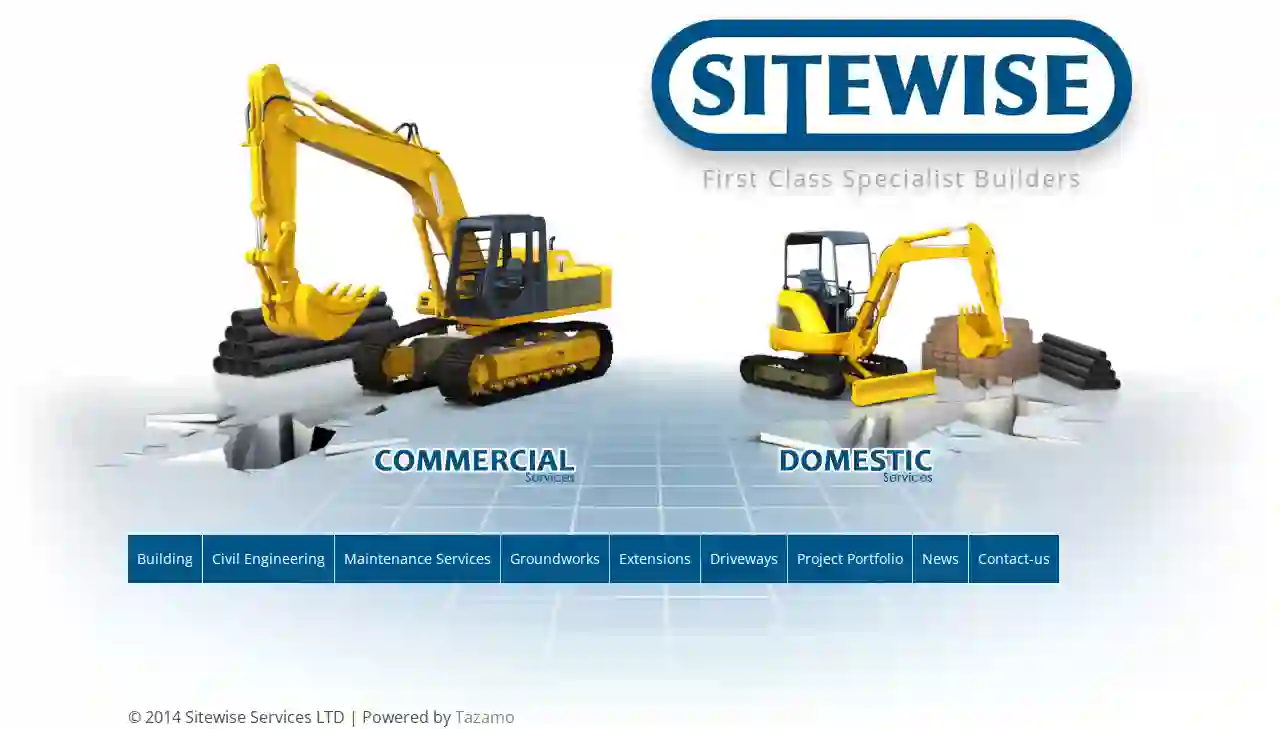Demolition Contractors Telford
Find top Demolition Contractors Near Me in Telford
Get multiple Demolition Companies quotes for your project today! Compare profiles, reviews, accreditations, portfolio, etc... and choose the best deal.

Metro Rod (Shropshire)
4.822 reviewsAshwood Court, Tytherington Business Park, Macclesfield, Cheshire, SK10 2XF, GBMetro Rod Mid Wales & Shropshire Local, trusted drainage engineers available for all drain repair, drain unblocking, septic tank, and pump issues. Metro Rod-Mid Wales & Shropshire has you covered. Contact us today for a quote and free site-assessment. Services in Mid Wales & Shropshire We offer a wide range of drainage services to both domestic and commercial customers in Mid Wales & Shropshire. Our team of experienced engineers are available 24/7 to help with any drainage problem, no matter how big or small. Our Services Include: Drain care & repair Tanker services Pump maintenance Septic tanks and sewage treatment plants Why Choose Metro Rod Mid Wales & Shropshire? 24/7 emergency service Free site assessments Competitive prices Experienced and qualified engineers Excellent customer service
- Services
- Why Us?
- Gallery
Get Quote
One Source Construction Services
54 reviews17 Foresters Close, Horsehay, Telford, Shropshire, TF4 3BW, GBAbout Us One Source construction Services are based in Telford, We cover works within the Midlands area. Our projects include both new construction, repairs/restorations across all areas of the industry. Occupied and fully operational job sites are never a problem. Also, we can plan, manage, and build multi-phase jobs. At One Source Construction Services we aim to be a one stop shop where we take all the stress of organising your project so you don`t have to. Working Together We offer an end-to-end client experience that includes; seamless communication, budgeting, staffing, on-site organisation, and solid, quality handy-work every time. Why Choose Us? We carry out all aspects of construction works projects, big or small. Call us today and bring our project management skills and extensive construction experience to your next project.
- Services
- Why Us?
- Gallery
Get Quote
Sitewise Services (Wellington) Ltd
51 reviews65 Sheriffhales, Shifnal, 65 Sheriffhales Shifnal Shropshire, TF11 8RQ, GBAbout Sitewise Services Sitewise Services is a reputable building and civil engineering company based in Shropshire, UK. We specialize in a wide range of services, including groundworks, extensions, driveways, and maintenance. Our team of experienced professionals is dedicated to delivering high-quality workmanship and exceeding client expectations. We pride ourselves on our commitment to customer satisfaction and our ability to complete projects on time and within budget.
- Services
- Why Us?
- Gallery
Get Quote
Farmer Plant Services
1Telford, GBFarmer Plant Services: Your Trusted Partner for Environmental Projects Farmer Plant Services is a company with a wealth of experience in delivering a wide range of environmental projects. We are dedicated to providing high-quality services that meet the specific needs of our clients. Whether you require the construction of a wildlife pool, the installation of a slate bridge, or the creation of woodland tracks, our team has the expertise and commitment to deliver exceptional results. We understand the importance of working in harmony with the environment. Our team is highly skilled in navigating challenging terrain, including rough terrain and sloping ground. We are committed to minimizing our environmental impact and ensuring the sustainability of our projects. Explore our website to learn more about our services and view examples of our past projects. Contact us today to discuss your environmental project needs and let us help you bring your vision to life.
- Services
- Why Us?
- Gallery
Get Quote
Over 3,630+ Excavation Companies on our platform
Our excavation pros operate in Telford and surroundings!
ExcavationHQ has curated and vetted the Best Excavation Contractors in and around Telford. Find the most trustworthy business today.
Frequently Asked Questions About Demolition Contractors
- Implosion: Using explosives to collapse a structure inwards rapidly. Suitable for large buildings in open areas.
- Wrecking Ball: Swinging a large steel ball to impact and break down the structure. Effective for bringing down walls and other solid elements.
- High-Reach Demolition: Utilizing specialized excavators with extended arms and demolition attachments for dismantling tall structures piece by piece.
- Selective Demolition: Removing specific parts of a building while preserving other sections. Often used in renovation projects.
- Deconstruction: Carefully dismantling a building to salvage reusable materials, reducing waste and environmental impact.
- Site Security: Secure the demolition site with fencing and warning signs to prevent unauthorized access.
- Personal Protective Equipment (PPE): Workers should wear appropriate PPE, including hard hats, safety glasses, gloves, and steel-toe boots.
- Hazardous Material Removal: Properly identify and remove asbestos, lead paint, or other hazardous materials before demolition begins.
- Utility Disconnections: Disconnect all utilities, such as electricity, gas, and water, before demolition.
- Controlled Demolition Techniques: Employ controlled demolition methods to minimize risks and ensure the structure comes down safely.
- Dust Control: Implement dust suppression measures, such as water spraying or misting, to reduce airborne particles and protect air quality.
- Emergency Planning: Have an emergency plan in place, including communication protocols and evacuation procedures, in case of unforeseen events.
- Recycling: Concrete, brick, metal, and wood can be recycled and reused in other construction projects, reducing waste sent to landfills.
- Landfill Disposal: Non-recyclable materials are disposed of in designated landfills according to local regulations.
- Donation: Some materials, such as fixtures or appliances, may be suitable for donation to charitable organizations.
What is the difference between demolition and deconstruction?
Demolition: Typically involves bringing down a structure quickly and efficiently, often using heavy machinery and potentially explosives. The primary goal is to clear the site.
Deconstruction: Focuses on carefully dismantling a building piece by piece to salvage reusable materials. It prioritizes minimizing waste and environmental impact, often involving manual labor and specialized tools.
The choice between demolition and deconstruction depends on the project's objectives, budget, and environmental considerations.
What are the different types of demolition?
What are the safety precautions for demolition?
What happens to the debris after demolition?
What is the difference between demolition and deconstruction?
Demolition: Typically involves bringing down a structure quickly and efficiently, often using heavy machinery and potentially explosives. The primary goal is to clear the site.
Deconstruction: Focuses on carefully dismantling a building piece by piece to salvage reusable materials. It prioritizes minimizing waste and environmental impact, often involving manual labor and specialized tools.
The choice between demolition and deconstruction depends on the project's objectives, budget, and environmental considerations.
What are the different types of demolition?
- Implosion: Using explosives to collapse a structure inwards rapidly. Suitable for large buildings in open areas.
- Wrecking Ball: Swinging a large steel ball to impact and break down the structure. Effective for bringing down walls and other solid elements.
- High-Reach Demolition: Utilizing specialized excavators with extended arms and demolition attachments for dismantling tall structures piece by piece.
- Selective Demolition: Removing specific parts of a building while preserving other sections. Often used in renovation projects.
- Deconstruction: Carefully dismantling a building to salvage reusable materials, reducing waste and environmental impact.
What are the safety precautions for demolition?
- Site Security: Secure the demolition site with fencing and warning signs to prevent unauthorized access.
- Personal Protective Equipment (PPE): Workers should wear appropriate PPE, including hard hats, safety glasses, gloves, and steel-toe boots.
- Hazardous Material Removal: Properly identify and remove asbestos, lead paint, or other hazardous materials before demolition begins.
- Utility Disconnections: Disconnect all utilities, such as electricity, gas, and water, before demolition.
- Controlled Demolition Techniques: Employ controlled demolition methods to minimize risks and ensure the structure comes down safely.
- Dust Control: Implement dust suppression measures, such as water spraying or misting, to reduce airborne particles and protect air quality.
- Emergency Planning: Have an emergency plan in place, including communication protocols and evacuation procedures, in case of unforeseen events.
What happens to the debris after demolition?
- Recycling: Concrete, brick, metal, and wood can be recycled and reused in other construction projects, reducing waste sent to landfills.
- Landfill Disposal: Non-recyclable materials are disposed of in designated landfills according to local regulations.
- Donation: Some materials, such as fixtures or appliances, may be suitable for donation to charitable organizations.